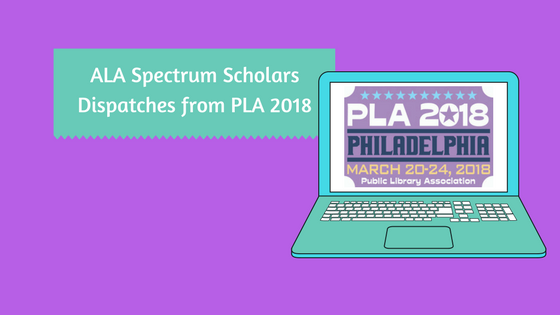Providing Immigration Services and Rebuilding Latinx Outreach

By Aldo Vasquez, avasquez901@gmail.com.
While attending the 2018 PLA conference in Philadelphia, I was thrilled to see a number of sessions that discussed the many issues that are affecting public libraries and their communities. Working at a public library in a densely populated Latinx neighborhood, I was hoping to attend sessions that would introduce me to resources and strategies to better serve this community. Now, perhaps more than ever, it is vital for libraries to support their Latinx populations. Two sessions that were the most impactful and beneficial to this cause, were “Providing Immigration Services in Public Libraries: Making It Possible is Not Impossible” and “(Re)Building Latina/o Outreach: Steps to Engaging Your Community.”
During the session, “Providing Immigration Services in Public Libraries: Making It Possible, Not Impossible,” Madeleine Ildefonso (Los Angeles Public Library) and Sara Jones (Marin County Library) explained the importance of providing services and adequate resources for immigrants. One of the leaders in this initiative, the Los Angeles Public Library has recently developed the New Americans program. This program helps immigrants on their path to citizenship by expanding their access to information, services,and resources. The centers are fully staffed with immigration-trained and Department of Justice-certified library staff who can help patrons utilize civic kits, multimedia resources, and other informational material.
Drawing inspiration from the Hartford Library system, which received the Board of Immigration Appeals Recognition and Accreditation, the Los Angeles Public Library continues to develop new immigration and naturalization services to assist their patrons and provide adequate resources. Presenters encouraged libraries to seek recognition and accreditation for its staff. Recognition and accreditation is the Department of Justice’s certification of charitable immigration agencies and staff, and allows non-attorney staff to practice immigration law before the U.S. Citizenship and Immigration Services (USCIS) and the immigration courts. The training is intense, lasting several months, and libraries can go for partial or full accreditation, which adjusts duties to filling out US Citizenship and Immigration Services forms to representing individuals before courts and Executive Office for Review.
In order for patrons to learn about programs such as the “New Americans Initiative,” libraries must conduct outreach in their communities. During the session, “(Re)Building Latina/o Outreach: Steps to Engaging Your Community,” presenter Miguel Ruiz, the Latino Engagement Librarian at the Evanston Library in Illinois, outlined different strategies and steps that libraries could take to strengthen outreach initiatives in their Latinx communities. Ruiz emphasized the importance of connecting with previous, existing, and potential community partners. By contacting, calling, and emailing individuals and institutions who actively engage Latinx residents, we create new opportunities for partnership and collaboration. In order to establish these connections, one must first locate and analyze the communities’ local and national resources. It is important to research organizations and resources that map to existing and potential library services. This method has allowed Ruiz to build high quality programming and form partnerships with like minded groups and individuals.
Conducting outreach in unconventional locations such as farmers markets, street festivals, and faith based organizations, has allowed Ruiz to reach individuals who are not familiar with library services. In order to ensure that these individuals are receiving services and programs that pertain to their needs, he has also created advisory committees. These committees aid in developing beneficial programming and services. Through these committees, Ruiz has been able to gather new ideas, identify new opportunities, and learn of certain challenges. Furthermore, engaging directly with community members has led to the development of Latinx advocacy groups, who recognize that library can provide equitable access to cultural, intellectual, technological, and information resources. Leaving PLA 2018, I am hopeful that libraries will continue to develop beneficial programming and resources to their Latinx population and communities.
Tags: Immigration services in public libraries, New Americans Program Los Angeles Public Library, public libraries serving latinx populations












